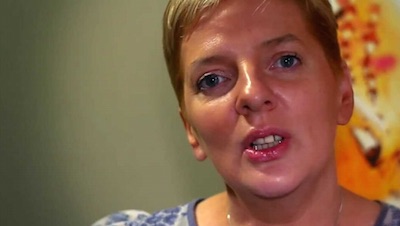
A Sinn Fein member of the European Parliament is refusing to speak any language other than her native Gaelic, in protest at the European Union’s failure to fulfil its designation of Irish as a full official language of the EU.
Sinn Fein MEP Liadh Ni Riada has said she will continue the ‘stailc teanga’ until the end of next week as a protest against the derogation on Irish in the EU “and to highlight the Irish government’s lack of movement in securing an end to the languages second-class status”.
Liadh Ni Riada announced the strike during remarks at the International Conference on Language Rights hosted in Dublin by Conradh na Gaeilge [the Gaelic League] as part of its Seachtain na Gaeilge [Irish Week].
“For the duration of Seachtain na Gaeilge I will be on a language strike,” Ms Ni Riada said.
“This means I will only speak Irish in my work with the European Institutions as a protest against the derogation.
“My aim is to draw attention to derogation and to encourage the Irish Language community and the Irish people in general to put pressure on the Government to remedy the situation.
“I have received support from MEPs from many countries and political groups, and I am calling on all Irish MEPs to support my campaign. I have invited MEPs that speak Irish to join me on the strike.”
Irish Gaelic received full status in the EU in 2007 but since that time a derogation, or opt-out clause, has been in place. The European Institutions are not obliged to provide full translation or interpretation services in Irish, as they do with all other official EU languages.
Ms Ni Riada said she was ‘saddened’ that as a public representative, an Irish person, and a woman from the Gaeltacht who grew up with Irish, that she cannot use her own language as she goes about her work.
“It angers me when I sit in Parliament and I am told at the beginning of each meeting that an interpretation service is available in each language. Of course Irish is excluded and ignored,” she said.
“Lifting the derogation will mean that 188 jobs will be created at no great cost to the European Union, but with huge ramifications for the Irish language and Gaeltacht communities. To create these jobs the Irish Government needs only send a formal request to the Council of Ministers to end the derogation.
“There is a deadline pending however. The Government will need to make a decision on this and request an end to the derogation by the end of this year. If they don’t lift the derogation now there won’t be another chance until 2020.”
Ms Ni Riada called for “widespread support” for the language strike.
Ghlaoch si ar dhaoine chun a stailc teanga fhein a thosnu tri labhairt Gaeilge amhain ar feadh tamall le linn Seachtain na Gaeilge, agus an achaine seo thios a shiniu.
[She called on others to begin their own strike by only speaking Irish for a period of time during Seachtan na Gaeilge, and to sign the petition below.]
She said they can share details of their strike using hashtag #StailcTeanga.
[Duirt si gurb feidir leo na sonruithe dena stailc ag baint usaid as an hashtag #StailcTeanga.]
* The petition to call on the Dublin government to being an end to the derogation is online at https://chn.ge/1N85fGq
![[Irish Republican News]](https://republican-news.org/graphics/title_gifs/rn.gif)
![[Irish Republican News]](https://republican-news.org/graphics/title_gifs/harp.gif)

